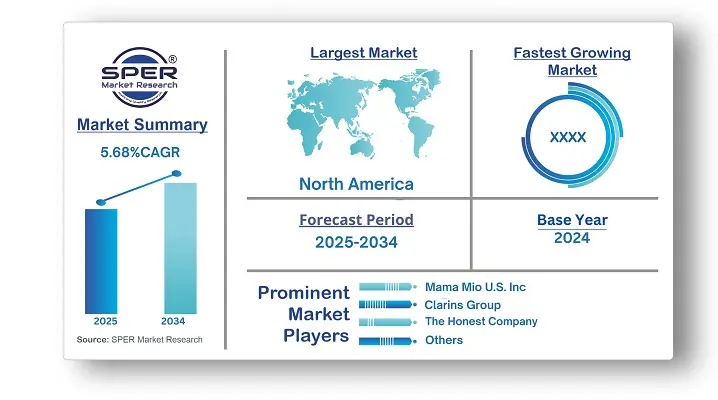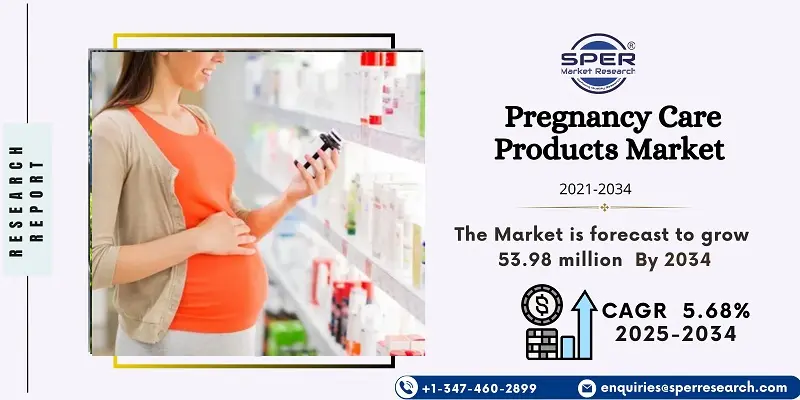Pregnancy Care Products Market Introduction and Overview
According to SPER Market Research, the Global Pregnancy Care Products Market is estimated to reach USD 53.98 million by 2034 with a CAGR of 5.68%
The report includes an in-depth analysis of the Global Pregnancy Care Products Market, including market size and trends, product mix, Applications, and supplier analysis. The market for pregnancy care goods is growing as a result of growing demand for safe and efficient prenatal and postnatal care as well as increased awareness of maternal health. Growing disposable expenditures, an increase in first-time pregnancies, and developments in cosmetics and nutrition products that are chemical-free and organic are some of the main factors driving this trend. Healthcare professionals' endorsements and social media's influence both contribute to the market's expansion. Widespread acceptance is hampered by issues including exorbitant product pricing, a lack of knowledge in developing nations, and worries about product safety. Furthermore, there are dangers associated with the existence of fake goods.
By Product Insights
Pregnancy Care Products is classified into six categories based on Product: Stretch Mark Minimizer, Breast Cream, Toning/Firming Lotion, Itching Prevention Cream, Nipple Protection Cream and Body Restructuring Gel. The market share of the stretch marks minimizer category was substantial. This is explained by the increased prevalence of stretch marks during pregnancy as well as growing consumer awareness. The market for breast cream is anticipated to expand considerably over the course of the projected period. The increased knowledge of the importance of breast health during pregnancy and lactation is the reason behind this.
By Stage of Pregnancy Insights
The market for Pregnancy Care Products is segmented based on Stage of Pregnancy, including Pre-conception, First Trimester, Second Trimester, Third Trimester and Postpartum. The market was dominated by the third trimester category. This is because, as the pregnancy nears its end and the danger of stillbirth rises, the third trimester is when the greatest demand for pregnancy care products that offer comfort, support, and health advantages for both mother and baby occurs. It is anticipated that the postpartum category will expand at a substantial CAGR. It is ascribed to increased postpartum health awareness, encouraging government programs, and growing female employment.
By Application Insights
The market for Pregnancy Care Products is segmented based on Applications, including Orthopedic Care, Urinary Incontinence, Breast Cancer Care, Pelvic Pain, Lymphedema, Pregnancy and Postpartum Care. Growing awareness of maternal health and availability in healthcare settings led to the greatest market revenue from orthopedic care. The fastest compound annual growth rate (CAGR) is anticipated for urinary incontinence during the projection period. This is due to variables including hormonal changes in the body and increasing strain on the bladder as the uterus grows.
By Distribution Channel Insights
The market for Pregnancy Care Products is divided based on Distribution Channel, including Hospital Pharmacies, Independent Pharmacies, Hypermarkets/Supermarkets, Online/ E-commerce. The market was dominated by hospital pharmacies. It is ascribed to specialist treatment, trust and dependability, and higher birth rates in hospital environments. Over the course of the projected period, the online/e-commerce category is anticipated to increase significantly. It can be linked to increased digital literacy, a greater selection of products, and the ease and accessibility provided by internet platforms.
By Regional Insights
The market for pregnancy care products is dominated by North America. It is ascribed to the region's expanding birth rate, greater awareness among prospective parents, growing demand for prenatal care items, and rising disposable income. The enhanced healthcare industry as well as the financing and investment provided by governments across the globe have further fuelled market expansion.
Market Competitive Landscape
Many major industry participants are introducing new product lines to the market that feature cutting-edge features, improved security, and increased convenience. These products include a wide range of products, such as tailored skincare products, eco-friendly maternity clothing, and smart pregnancy monitoring devices. Some of the key market players are Mama Mio U.S. Inc., Clarins Group, Novena Maternity, E.T. Browne Drug Co., Inc., Expanscience Laboratories, Inc., Noodle & Boo, Abbott, The Honest Company, Inc., Lansinoh Laboratories and Mankind Pharma.
Recent Developments:
In November 2024, More attention and demand for safer alternatives originated from a study that raised concerns about the presence of harmful PFAS chemicals in personal care products used by expectant and nursing mothers.
In November 2024, the business owners of the women's health and vitamin brand Perelel, Alex Taylor and Victoria Thain Gioia, started a nationwide campaign to support more NIH funding for women's health research, emphasizing the significance of better maternal care and support.
Scope of the report:
| Report Metric | Details |
| Market size available for years | 2021-2034 |
| Base year considered | 2024 |
| Forecast period | 2025-2034 |
| Segments covered | By Product, By Stage of Pregnancy, By Application, By Distribution Channel |
| Regions covered | North America, Latin America, Asia-Pacific, Europe, and Middle East & Africa |
| Companies Covered | Mama Mio U.S. Inc., Clarins Group, Novena Maternity, E.T. Browne Drug Co., Inc., Expanscience Laboratories, Inc., Noodle & Boo, Abbott, The Honest Company, Inc., Lansinoh Laboratories, Mankind Pharma.
|
<
Key Topics Covered in the Report
- Global Pregnancy Care Products Market Size (FY’2021-FY’2034)
- Overview of Global Pregnancy Care Products Market
- Segmentation of Global Pregnancy Care Products Market By Product (Stretch Mark Minimizer, Breast Cream, Toning/Firming Lotion, Itching Prevention Cream, Nipple Protection Cream, Body Restructuring Gel)
- Segmentation of Global Pregnancy Care Products Market By Stage of Pregnancy (Pre-conception, First Trimester, Second Trimester, Third Trimester, Postpartum)
- Segmentation of Global Pregnancy Care Products Market By Application (Orthopedic Care, Urinary Incontinence, Breast Cancer Care, Pelvic Pain, Lymphedema, Pregnancy and Postpartum Care)
- Segmentation of Global Pregnancy Care Products Market By Distribution Channel (Hospital Pharmacies, Independent Pharmacies, Hypermarkets/Supermarkets, Online/ E-commerce)
- Statistical Snap of Global Pregnancy Care Products Market
- Expansion Analysis of Global Pregnancy Care Products Market
- Problems and Obstacles in Global Pregnancy Care Products Market
- Competitive Landscape in the Global Pregnancy Care Products Market
- Details on Current Investment in Global Pregnancy Care Products Market
- Competitive Analysis of Global Pregnancy Care Products Market
- Prominent Players in the Global Pregnancy Care Products Market
- SWOT Analysis of Global Pregnancy Care Products Market
- Global Pregnancy Care Products Market Future Outlook and Projections (FY’2025-FY’2034)
- Recommendations from Analyst
1. Introduction
1.1. Scope of the report
1.2. Market segment analysis
2. Research Methodology
2.1. Research data source
2.1.1. Secondary Data
2.1.2. Primary Data
2.1.3. SPER’s internal database
2.1.4. Premium insight from KOL’s
2.2. Market size estimation
2.2.1. Top-down and Bottom-up approach
2.3. Data triangulation
3. Executive Summary
4. Market Dynamics
4.1. Driver, Restraint, Opportunity and Challenges analysis
4.1.1. Drivers
4.1.2. Restraints
4.1.3. Opportunities
4.1.4. Challenges
5. Market variable and outlook
5.1. SWOT Analysis
5.1.1. Strengths
5.1.2. Weaknesses
5.1.3. Opportunities
5.1.4. Threats
5.2. PESTEL Analysis
5.2.1. Political Landscape
5.2.2. Economic Landscape
5.2.3. Social Landscape
5.2.4. Technological Landscape
5.2.5. Environmental Landscape
5.2.6. Legal Landscape
5.3. PORTER’s Five Forces
5.3.1. Bargaining power of suppliers
5.3.2. Bargaining power of buyers
5.3.3. Threat of Substitute
5.3.4. Threat of new entrant
5.3.5. Competitive rivalry
5.4. Heat Map Analysis
6. Competitive Landscape
6.1. Global Pregnancy Care Products Market Manufacturing Base Distribution, Sales Area, Product Type
6.2. Mergers & Acquisitions, Partnerships, Product Launch, and Collaboration in Global Pregnancy Care Products Market
7. Global Pregnancy Care Products Market, By Product 2021-2034 (USD Million)
7.1. Stretch Mark Minimizer
7.2. Breast Cream
7.3. Toning/Firming Lotion
7.4. Itching Prevention Cream
7.5. Nipple Protection Cream
7.6. Body Restructuring Gel
8. Global Pregnancy Care Products Market, By Stage of Pregnancy 2021-2034 (USD Million)
8.1. Pre-conception
8.2. First Trimester
8.3. Second Trimester
8.4. Third Trimester
8.5. Postpartum
9. Global Pregnancy Care Products Market, By Application 2021-2034 (USD Million)
9.1. Orthopedic Care
9.2. Urinary Incontinence
9.3. Breast Cancer Care
9.4. Pelvic Pain
9.5. Lymphedema
9.6. Pregnancy and Postpartum Care
10. Global Pregnancy Care Products Market, By Distribution Channel 2021-2034 (USD Million)
10.1. Hospital Pharmacies
10.2. Independent Pharmacies
10.3. Hypermarkets/Supermarkets
10.4. Online/ E-commerce
11. Global Pregnancy Care Products Market, 2021-2034 (USD Million)
11.1. Global Pregnancy Care Products Market Size and Market Share
12. Global Pregnancy Care Products Market, By Region, 2021-2034 (USD Million)
12.1. Asia-Pacific
12.1.1. Australia
12.1.2. China
12.1.3. India
12.1.4. Japan
12.1.5. South Korea
12.1.6. Rest of Asia-Pacific
12.2. Europe
12.2.1. France
12.2.2. Germany
12.2.3. Italy
12.2.4. Spain
12.2.5. United Kingdom
12.2.6. Rest of Europe
12.3. Middle East and Africa
12.3.1. Kingdom of Saudi Arabia
12.3.2. United Arab Emirates
12.3.3. Qatar
12.3.4. South Africa
12.3.5. Egypt
12.3.6. Morocco
12.3.7. Nigeria
12.3.8. Rest of Middle-East and Africa
12.4. North America
12.4.1. Canada
12.4.2. Mexico
12.4.3. United States
12.5. Latin America
12.5.1. Argentina
12.5.2. Brazil
12.5.3. Rest of Latin America
13. Company Profile
13.1. Abbott
13.1.1. Company details
13.1.2. Financial outlook
13.1.3. Product summary
13.1.4. Recent developments
13.2. Clarins Group
13.2.1. Company details
13.2.2. Financial outlook
13.2.3. Product summary
13.2.4. Recent developments
13.3. E.T. Browne Drug Co., Inc.
13.3.1. Company details
13.3.2. Financial outlook
13.3.3. Product summary
13.3.4. Recent developments
3.4. Expanscience Laboratories, Inc.
13.4.1. Company details
13.4.2. Financial outlook
13.4.3. Product summary
13.4.4. Recent developments
13.5. Lansinoh Laboratories
13.5.1. Company details
13.5.2. Financial outlook
13.5.3. Product summary
13.5.4. Recent developments
13.6. Mama Mio U.S. Inc.
13.6.1. Company details
13.6.2. Financial outlook
13.6.3. Product summary
13.6.4. Recent developments
13.7. Mankind Pharma
13.7.1. Company details
13.7.2. Financial outlook
13.7.3. Product summary
13.7.4. Recent developments
13.8. Noodle & Boo
13.8.1. Company details
13.8.2. Financial outlook
13.8.3. Product summary
13.8.4. Recent developments
13.9. Novena Maternity
13.9.1. Company details
13.9.2. Financial outlook
13.9.3. Product summary
13.9.4. Recent developments
13.10. The Honest Company, Inc.
13.10.1. Company details
13.10.2. Financial outlook
13.10.3. Product summary
13.10.4. Recent developments
13.11. Others
14. Conclusion
15. List of Abbreviations
16. Reference Links
SPER Market Research’s methodology uses great emphasis on primary research to ensure that the market intelligence insights are up to date, reliable and accurate. Primary interviews are done with players involved in each phase of a supply chain to analyze the market forecasting. The secondary research method is used to help you fully understand how the future markets and the spending patterns look likes.
The report is based on in-depth qualitative and quantitative analysis of the Product Market. The quantitative analysis involves the application of various projection and sampling techniques. The qualitative analysis involves primary interviews, surveys, and vendor briefings. The data gathered as a result of these processes are validated through experts opinion. Our research methodology entails an ideal mixture of primary and secondary initiatives.





































